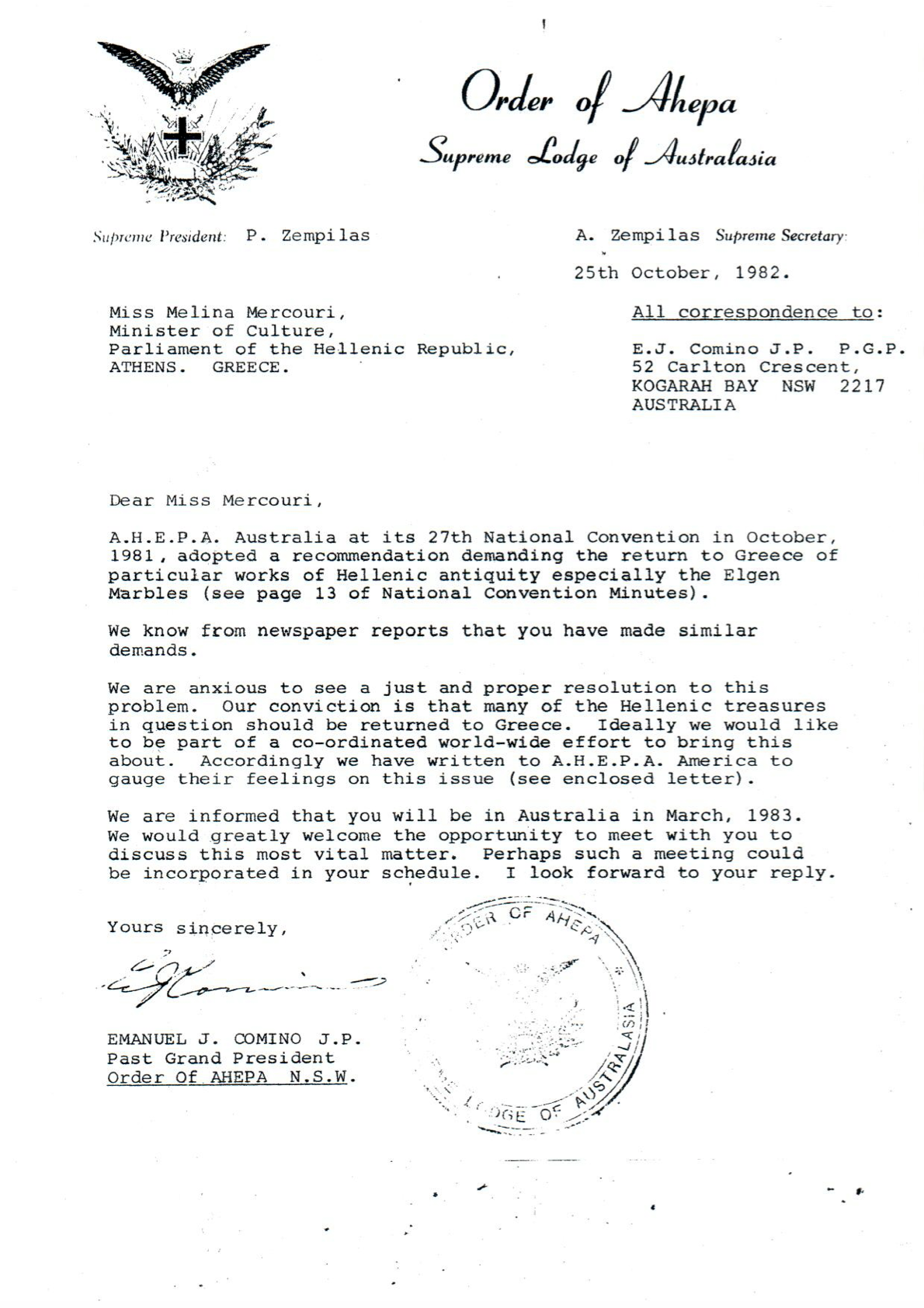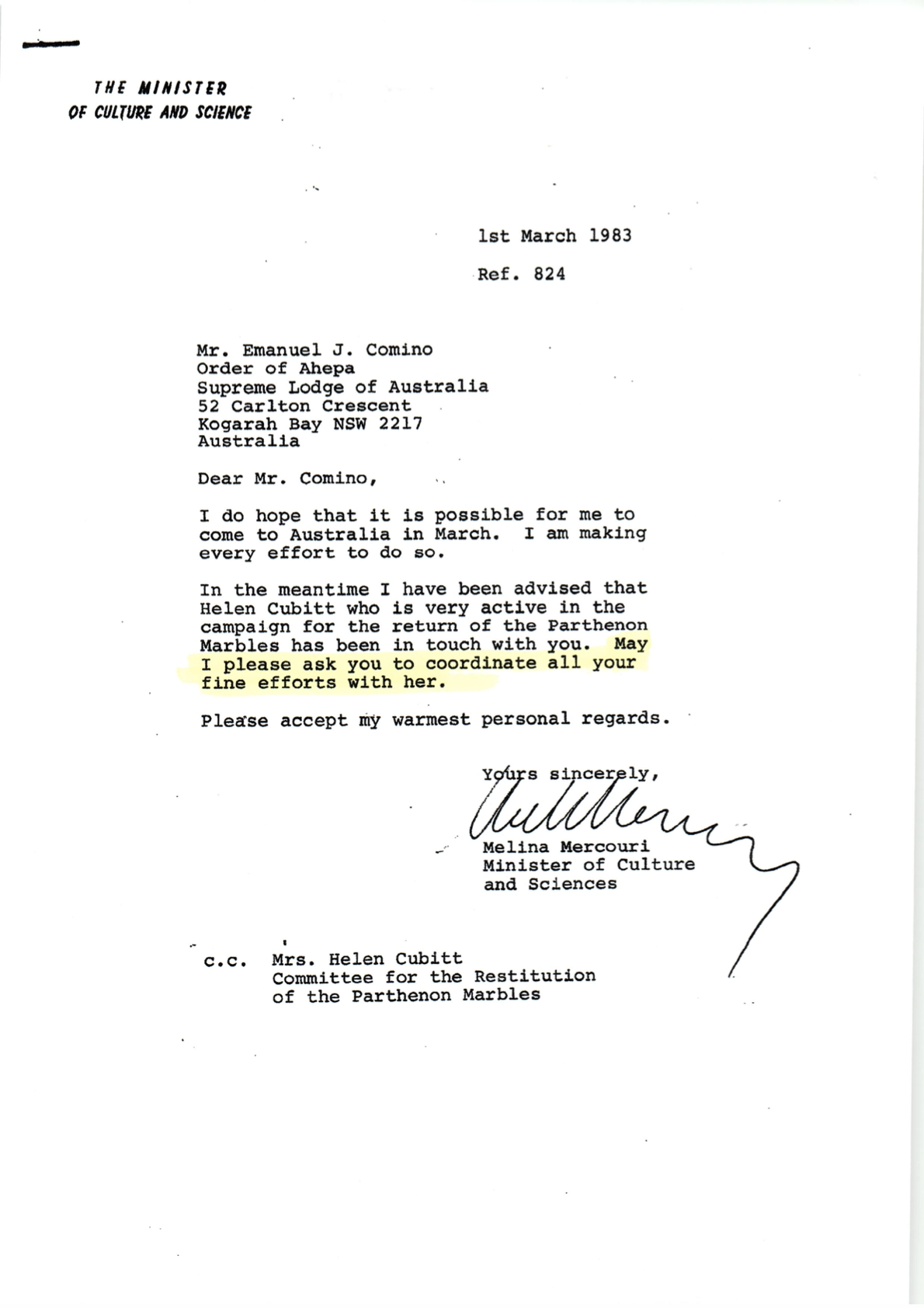Despite a mounting international campaign the British government has refused to sanction the return of the Parthenon Marbles to Greece.
In response, the AHEPA (Australia) Committee for the Restitution of the Parthenon Marbles was formed in 1981 under the chairmanship of Emanuel John Comino OAM, JP. It was the first committee in the world set up for restitution.
Following this, the demands were refined to the more specific demand for repatriation of the Elgin Marbles, before the more appropriate term, Parthenon Marbles was used.
As Minister of Culture and Sciences for Greece, Melina also addressed the 1982 World Conference on Cultural Policies, organised by UNESCO in Mexico. She told the conference that the Parthenon Marbles must be returned home to Greece.
Emanmuel saw an article about her address in the Sydney Morning Herald. He observed, “Parts of her brilliant speech in Mexico. She said in part:
I think that the time has come for these marbles to come back to the blue sky of Attica, to their natural space, to the place where they will be a structural and functional part of a unique whole.
We are not naive. The day may come when this world will create other visions, other concepts of what is proper, of what comprises a cultural patrimony and of human creativity. And we well understand that the museums cannot be emptied. But I insist on reminding you that in the case of the Acropolis marbles we are not asking for the return of a painting or a statue. We are asking for the return of a portion of a unique monument, the privileged symbol of a whole culture.
She was also reported as demanding that Britain return the Marbles, taken from the Acropolis at the start of the 19th century. She said that the act constituted “vandalism and barbarism,” and that the British Government’s refusal to return the marbles was provocative.
She observed that she had received favourable responses from other countries to her requests for the return, at least for a temporary exhibit in Greece, of antiquities kept in their museums. Britain was not so obliging and she said, “The different and negative attitude of the British Government is provocative and disturbing. . . and will be met in the same manner by us.
The New York Times reported her as saying, the plundering of the Acropolis monuments was worse than the Nazi pillaging of artworks in Europe during World War II. She added Greece had the same right to demand them back as the French had to demand their treasures from the Germans.


Emanuel reports: Early in 1983 I began to hear rumours that Melina was coming to Australia. So, I wrote to her and asked if we could meet and discuss the Parthenon Marbles campaign while she was in Sydney.
When she arrived in Sydney, the Premier of New South Wales invited me, along with some 25 other members of the Greek Australian community, to a meet Melina. At the beginning there was the usual formal line of guests who shook hands with her. I too greeted her in the formal manner. When she had settled into the meeting, I approach the official accompanying her and gave him a copy of the letter she had sent me. He walked over and handed it to her, on the other side of the room. She glanced at the letter, her face lite up, she threw up her hands, and turned towards me. She came straight across the room to me and hugged me.
We chatted a little about the Parthenon Marbles, but she soon had to move on and circulate amongst the other guests.
As she was leaving, she came over to me and said in Greek, “My boy, don’t ever stop the campaign for the return of the Parthenon Marbles to our country.”
I looked at her and replied, in English, “I will fight on for the return of the Parthenon Marbles until the England promises to send them back or until the day I die.”
She embraced me. There was a tear in her eye as she kissed me on the cheek.”
She didn’t kiss anyone else.
When Melina put Emanuel in touch with the newly formed British restitution committee a strong relationship developed. Our Committee has supported them financially and worked together with them since that time.
THIS IS A WORK IN PROPGRESS. THERE IS MORE TO COME
1 June, 1986.
In 1997, E.J. Comino was asked by the then Minister for Culture in the Greek Government, Professor Evangelos Venizelos, to make provision for non – AHEPAN and non-Hellenic members so the co-ordinating group was renamed “INTERNATIONAL ORGANISING COMMITTEE – AUSTRALIA – FOR THE RESTITUTION OF THE PARTHENON MARBLES” Inc.
The Committee is chaired by Emanuel John Comino AM JP who has campaigned since 1976 for the return of the Marbles, giving many lectures on the subject, throughout Australia and overseas.
In 2000 a New Zealand Committee was founded in Wellington by E.J. Comino and Gerald O’Brien was appointed as President.
In 2007 this Committee was successful in persuading the New Zealand Government to pass unanimously a motion to support the return of the Parthenon Marbles to Greece.
Our Committee aims to bring pressure to bear on governments and influences public opinion to ensure the return of the Parthenon Marbles to Greece.
The committee coordinates its efforts with associated international committees.
The Parthenon Marbles were and remain an integral part of the Parthenon, a monument to the glory of Classical Greece and the civilisation it gave the world.